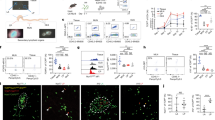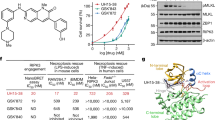Abstract
Pulmonary delivery of plasmid DNA (pDNA)/cationic liposome complexes is associated with an acute unmethylated CG dinucleotide (CpG)-mediated inflammatory response and brief duration of transgene expression. We demonstrate that retention of even a single CpG in pDNA is sufficient to elicit an inflammatory response, whereas CpG-free pDNA vectors do not. Using a CpG-free pDNA expression vector, we achieved sustained (≥56 d) in vivo transgene expression in the absence of lung inflammation.
This is a preview of subscription content, access via your institution
Access options
Subscribe to this journal
Receive 12 print issues and online access
$209.00 per year
only $17.42 per issue
Buy this article
- Purchase on Springer Link
- Instant access to full article PDF
Prices may be subject to local taxes which are calculated during checkout



Similar content being viewed by others
References
Hyde, S.C. et al. Gene Ther. 7, 1156–1165 (2000).
Alton, E.W. et al. Lancet 353, 947–954 (1999).
Eastman, S.J. et al. Hum. Gene Ther. 8, 765–773 (1997).
Gill, D.R. et al. Gene Ther. 8, 1539–1546 (2001).
Pringle, I.A. et al. Gene Ther. 12, 1206–1214 (2005).
Ruiz, F.E. et al. Hum. Gene Ther. 12, 751–761 (2001).
Hemmi, H. et al. Nature 408, 740–745 (2000).
Krieg, A.M. et al. Nature 374, 546–549 (1995).
McLachlan, G. et al. Gene Ther. 7, 384–392 (2000).
Yew, N.S. et al. Mol. Ther. 1, 255–262 (2000).
Wu, F. et al. J. Bacteriol. 177, 6338–6345 (1995).
Fed. Regist. 72, 61172 (2007).
European Pharmacopoeia 6.0, 5.14 667–676 (2007).
Dorin, J.R. et al. Gene Ther. 3, 797–801 (1996).
Harvey, B.G. et al. J. Clin. Invest. 104, 1245–1255 (1999).
Acknowledgements
This work was funded by a grant from the UK Cystic Fibrosis Trust to the UK CF Gene Therapy Consortium.
Author information
Authors and Affiliations
Contributions
S.C.H., I.A.P. and D.R.G. conceived the study, performed the research, interpreted the results and prepared the manuscript. S.C.H., I.A.P., S.A., A.E.L., L.A.D., A.V., G.N.-A., A.-M.G., R.P.B., S.G.S.-J., M.C., H.L., D.N.S., F.M.M. and D.R.G. contributed to the construction and/or testing of the pDNA vectors. N.S.Y., S.H.C., A.C.B., J.C.D., U.G., D.J.P., D.N.S., F.M.M. and E.W.F.W.A. provided useful discussion.
Corresponding author
Ethics declarations
Competing interests
S.C.H, I.A.P, A.E.L and D.R.G hold intellectual property in the fourth-generation zero-CpG vectors described in the paper.
Supplementary information
Supplementary Text and Figures
Figures 1–3, Methods (PDF 971 kb)
Rights and permissions
About this article
Cite this article
Hyde, S., Pringle, I., Abdullah, S. et al. CpG-free plasmids confer reduced inflammation and sustained pulmonary gene expression. Nat Biotechnol 26, 549–551 (2008). https://doi.org/10.1038/nbt1399
Received:
Accepted:
Published:
Issue Date:
DOI: https://doi.org/10.1038/nbt1399
This article is cited by
-
Nanoparticle-mediated tumor cell expression of mIL-12 via systemic gene delivery treats syngeneic models of murine lung cancers
Scientific Reports (2021)
-
Lentiviral and AAV-mediated expression of palivizumab offer protection against Respiratory Syncytial Virus infection
Scientific Reports (2021)
-
Identification of AAV serotypes for lung gene therapy in human embryonic stem cell-derived lung organoids
Stem Cell Research & Therapy (2020)
-
Engineered amphiphilic peptides enable delivery of proteins and CRISPR-associated nucleases to airway epithelia
Nature Communications (2019)
-
Beyond cystic fibrosis transmembrane conductance regulator therapy: a perspective on gene therapy and small molecule treatment for cystic fibrosis
Gene Therapy (2019)



